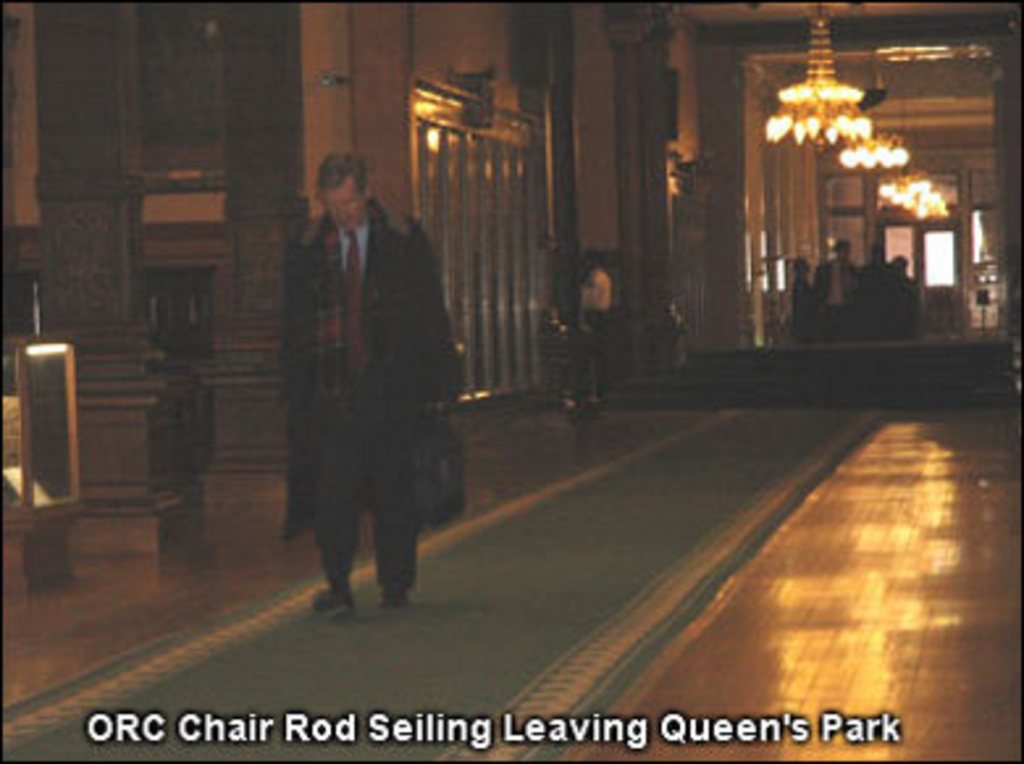
All's fair in politics and horse racing – even avoiding questions altogether or passing them off to your partners. To say the least, it was an eventful day at the Ontario Legislature, as the Standing Committee on Government Agencies reviewed the operations of the Ontario Racing Commission
.
Despite a full roster of discussions, ORC Chairman Rod Seiling hit the nail on the head just a few paragraphs into his opening remarks early this morning.
"An ongoing challenge for the racing industry, and therefore the Commission," said Seiling, "is its difficulty in understanding the roles and responsibilities of the Commission that flow from the [Racing Commission] Act. Adding to this difficulty is the division of responsibilities within the Commission – specifically between the governing board and the administration."
It's an inherent conflict in the dual mandate of the ORC – that they act as both a policing and an adjudicating body (among other things), and members of the committee picked up on the contradiction immediately.
"Don't you find a conflict of interest in your mandate?" asked MPP and Committee Vice-Chair Lisa MacLeod. She read aloud three submissions from horsepeople that highlighted the problem, including an excerpt from a lengthy letter by 78-year-old Mervin Bud Burke.
"The ORC is a large organization and needs experienced management that can draft a long-range business plan, draft a dress-code, a code of conduct and a clear understanding of integrity," wrote Burke. "Set up a professional enforcement team with the power and support to carry out their mandate."
The ORC had little response, aside from their insistence that the operation of their organization is, in fact, efficient and effective.
The Daily Racing Form, said Seiling, named the ORC 'Best in Class' in 2008 as compared to other similar bodies. But the following conversations suggested otherwise.
Topics ranged from the allocation of race dates, drug enforcement and the new track in Belleville to the potential nose-dive facing Fort Erie Raceway. Through it all, Seiling and Executive Director John Blakney mentioned more than once that the rest of the industry – with a diversity of interests – just doesn't understand the difficulty of offering cohesive solutions in the face of these issues.
"Surely there must be a great disconnect between the ORC and the rest of the industry," noted MacLeod in response. "If you say everyone doesn't understand," she raised an eyebrow, "I expect you also mean myself."
Recent events at Fort Erie dominated the remainder of the morning session, with MPP Tim Hudak in particular looking for information on how the ORC had counselled the Ontario government to act in order to save the financially troubled track. Little counsel was offered, it seems, in the 18 months since the ORC first realized the track had taken a turn for the worst, despite the fact that such action would be considered their responsibility.
Come afternoon, the Ontario Harness Horse Association, Hiawatha Horse Park, the Ontario Horse Racing Industry Association and the Standardbred Horse Owners Panel were each given thirty minutes to contribute their submissions to the review of the ORC.
OHHA director Darryl MacArthur made five distinct notes: that the ORC had no long-term vision for the harness racing industry, that their rule/decision making process was unclear, that the race dates they allocated were insufficient, that they had little strength in holding tracks accountable, and that they allowed potentially unfair track practices.
Robert Locke, General Manager at Hiawatha Horse Park and Chair of Racetracks Ontario, made some similar points but also brought two new ones to the table; he demanded that the ORC more effectively train and educate their judges, and also noted that tracks and horsemen alike were concerned about the ORC's power to intervene in issues of private property rights – though Locke had difficulty articulating precisely
what he meant by that later note.
OHRIA was next at bat, with a brief presentation but a strong suggestion – for the creation of a gaming secretary to work as a liaison between the OLG, the Ontario government and the horse racing community. The idea gained some momentum with MPP Peter Kormos, who was curious to hear more about progress in the after-math of the
Sadinsky report.
"Maybe it's a cheap claimer," joked OHRIA representative Hector Clouthier of the report, who laid out the potential roles and responsibilities his organization would willing to take over from the ORC (i.e. overseeing all commercial/economic aspects of the horse racing industry). The banter led to a debate between the two men about the place of horse racing in gaming and entertainment and Kormos seemed convinced that the slots pose a threat to horse-racing revenue.
"If gambling was an addictive drug," he grinned, "horse racing would be the pot as opposed to the crack cocaine." It's a different experience, he stressed, and his concern is primarily that at the end of the day, electronic gaming will win.
"I'm concerned all these efforts will be to no avail," he admitted.
Finally, SHOP wrapped the hearing by recommending that the ORC focus on its existing mandate without any expansion – allowing them to work at maintaining their current mission without added pressures. SHOP also suggested that the Commission try to strengthen the enforcement of existing rules.
"We'd like to see the rules considered a little more, and with more severe penalties for perpetrators," said Executive Director Dave Drew. "We don't need them in our industry."
Upon dismissal, the Standing Committee on Agencies gave no indication of when any comment or action on their behalf would arise as a result of today's proceedings.
(Kim Fisher for Trot Insider)

